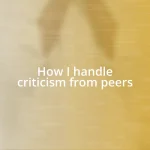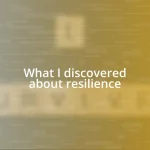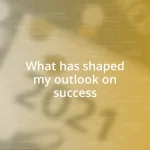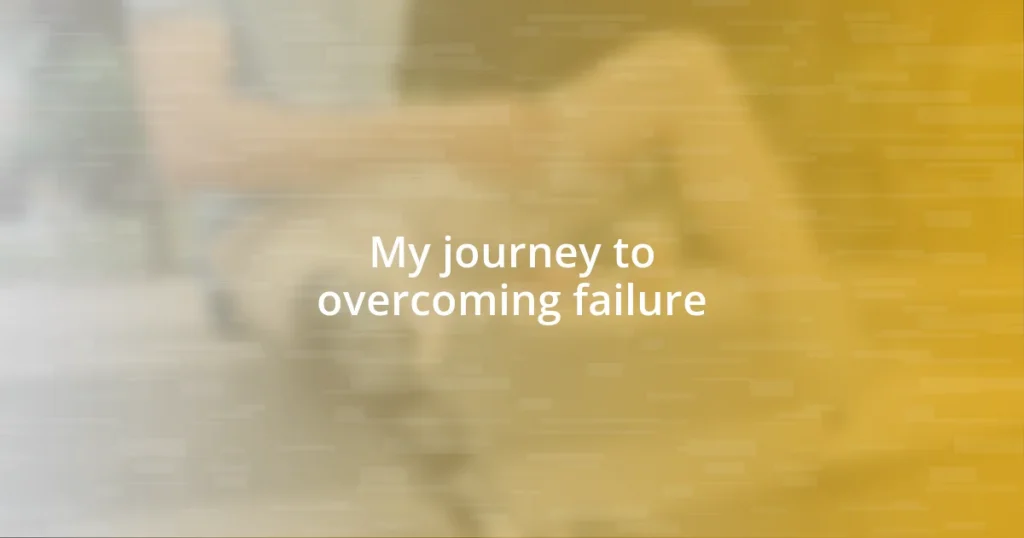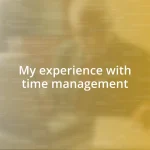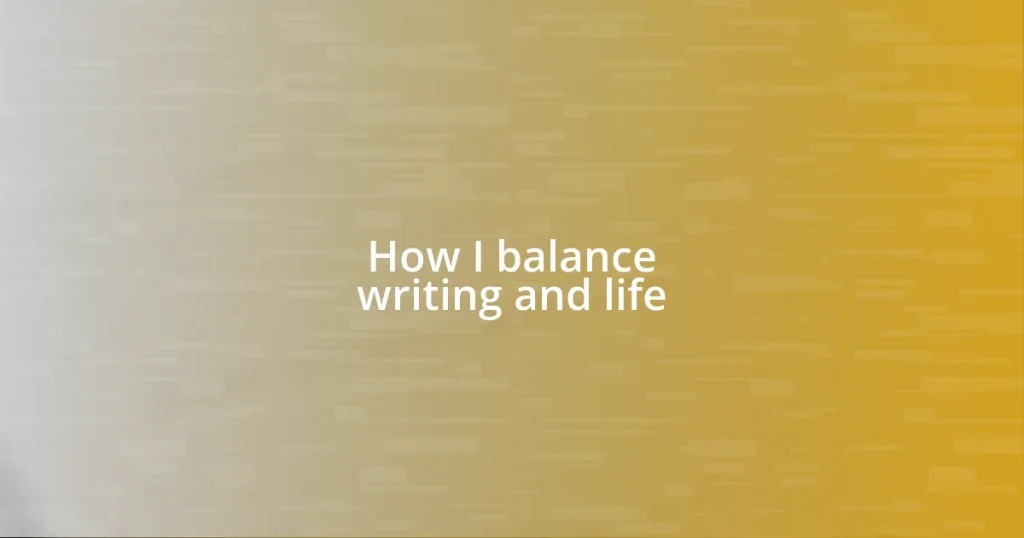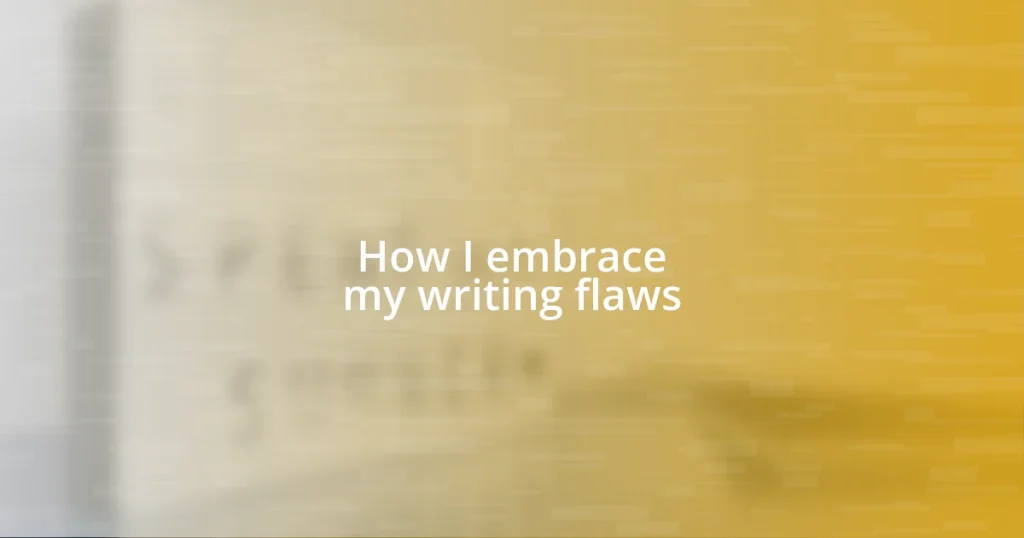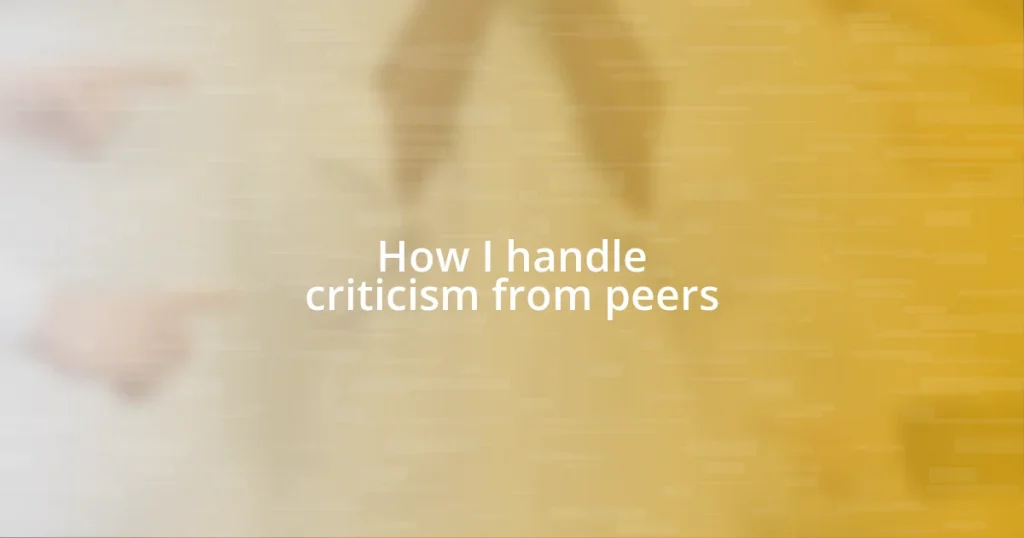Key takeaways:
- Failure is a powerful teacher, prompting personal growth and resilience when viewed as a learning opportunity rather than a setback.
- Setting realistic goals after failure is crucial; breaking them into smaller, achievable steps helps regain confidence and momentum.
- Celebrating small victories fosters a sense of accomplishment, encouraging continued progress and self-compassion on the journey of growth.
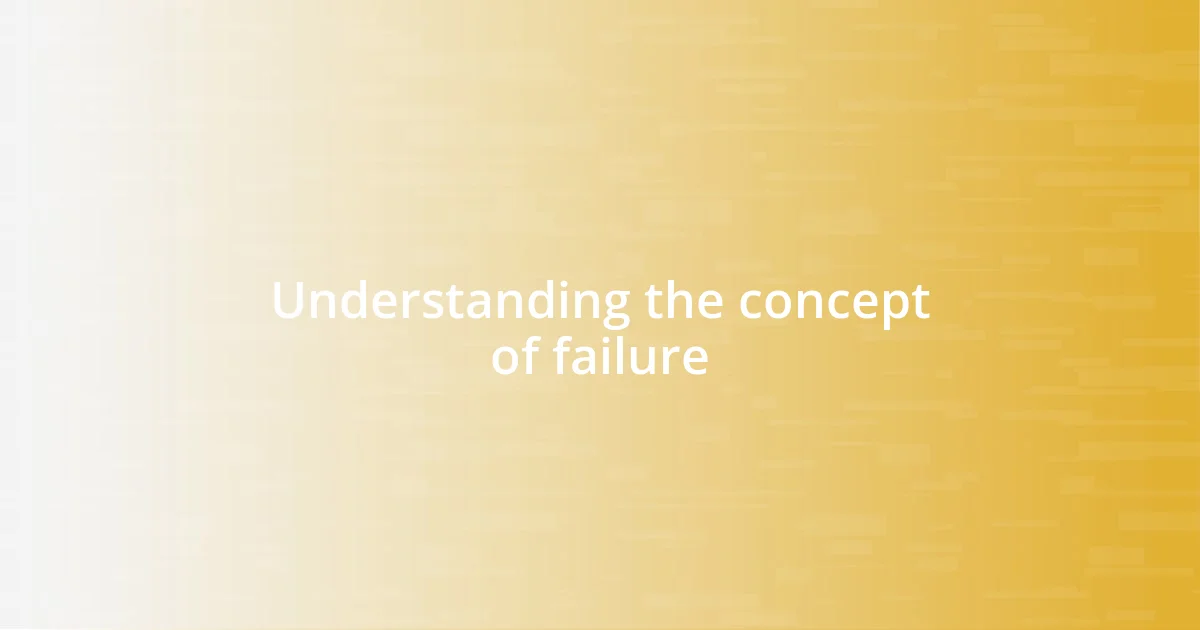
Understanding the concept of failure
Failure is often viewed as a negative experience, but I’ve come to see it as a powerful teacher. I remember a time when I completely bombed a presentation at work. Instead of focusing on my embarrassment, I began to examine what went wrong, which led me to develop my skills in public speaking. Isn’t it interesting how our worst moments can sometimes guide us to our greatest growth?
When I think about failure, I realize it’s a universal experience. Everyone has faced it at some point, yet we often feel isolated in our struggles. Have you ever felt that way? I can vividly recall sitting alone after receiving a rejection letter from a job I desperately wanted. At first, it stung, but later, it sparked a determination within me to refine my approach and keep pursuing opportunities. That moment turned out to be a cornerstone for my resilience.
Understanding failure requires us to shift our perspective; it’s not a full stop, but a comma in our narrative. It’s a chance to pause, reflect, and readjust our course. Just like the best stories often have conflicts, the most fulfilling journeys are marked by setbacks. Have you ever thought about how these setbacks shape our character? Each time we stumble, we gain insights that can propel us forward in ways we never imagined.
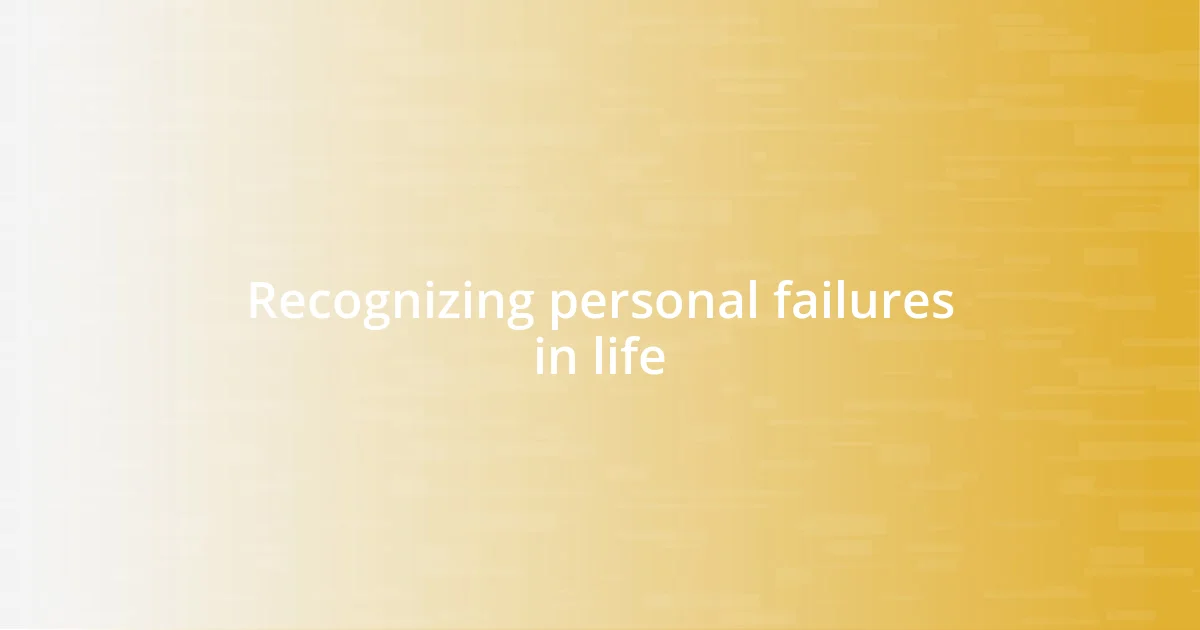
Recognizing personal failures in life
Recognizing personal failures is often the first step toward personal growth. I remember a time when I launched a project that I believed would be a huge hit. Unfortunately, it didn’t resonate with my audience at all. As I reflected on that experience, I realized I hadn’t truly understood their needs. This moment made me acutely aware of my tendency to rush into decisions without adequate research or feedback. It’s funny how a little humility can come from acknowledging our mistakes.
Here are some indicators that might help you recognize personal failures in your life:
- Disappointment in Outcomes: When results differ significantly from your expectations, it’s a signal to assess the factors at play.
- Consistent Patterns: Repeating the same mistakes despite knowing better often indicates an unresolved issue that needs addressing.
- Feedback from Others: Hearing constructive criticism can be tough, but it often points to areas where we may be lacking.
- Emotional Reactions: Strong feelings of frustration or sadness can hint that there’s something deeper to unpack.
- Avoiding Responsibilities: If you find yourself making excuses or blaming others, it might be time to look inward.
Recognizing these patterns not only sheds light on where we’ve faltered but also helps guide us in making better choices moving forward.
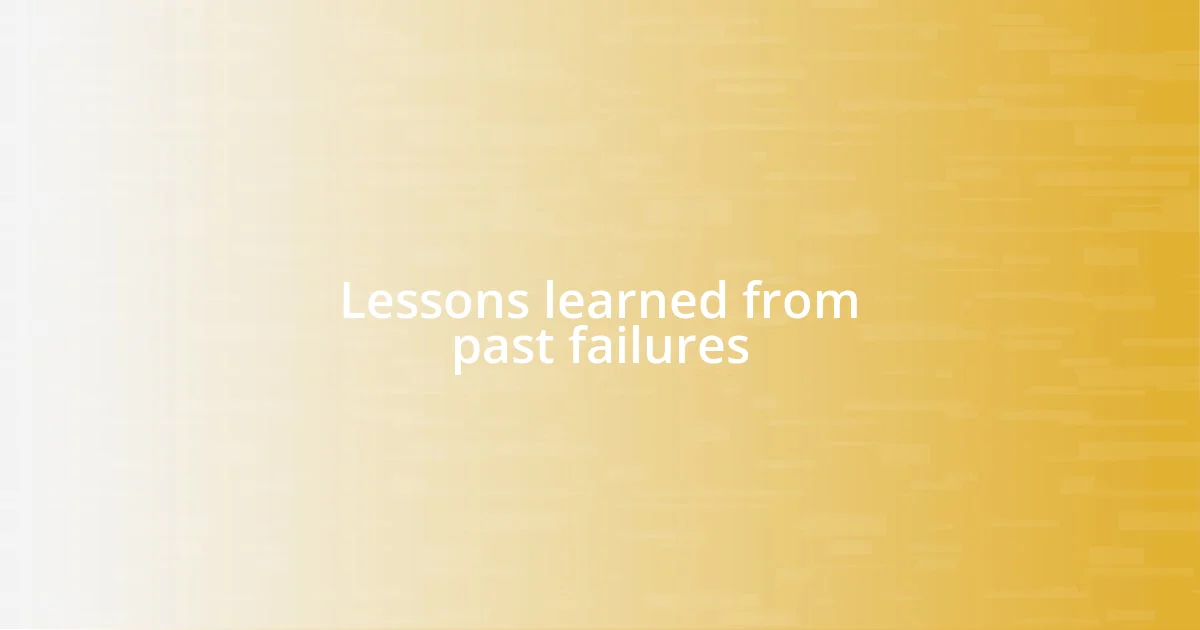
Lessons learned from past failures
Recognizing the lessons learned from past failures can truly transform our journey. One of the most striking examples in my life was when I launched a business that failed almost immediately. The financial loss was significant, yet it forced me to take a long, hard look at my approach. I realized that I had jumped in without a solid plan and hadn’t taken the time to understand my market. This experience taught me the importance of thorough research and strategic planning. Each failure, I believe, offers a unique lesson—we just have to be open to learning from it.
Another pivotal failure was during my college years when I attempted to balance studying with part-time work. I thought I could handle it all, but my grades plummeted as a result. The emotional weight of that experience was heavy; I felt overwhelmed and defeated. It served as a lesson in time management and the necessity of prioritizing effectively. Now, I reflect on that time and recognize how crucial it is to acknowledge my limits and to seek help when needed. Have you had a moment that made you reconsider your own capabilities?
Lastly, the hardest lesson I had to learn was about resilience. When I faced a major personal setback, it felt like the universe was throwing everything at me. I was left feeling broken and unsure. However, as I began to pick up the pieces, I discovered strength within myself that I hadn’t recognized before. This process taught me that failure isn’t just about the event; it’s about the recovery. It’s in these moments of darkness that we can truly discover our light.
| Experience | Lesson Learned |
|---|---|
| Business Launch Failure | Importance of thorough research and strategic planning |
| College Work-Life Balance | Need for prioritization and recognizing limits |
| Major Personal Setback | Resilience and the journey of recovery |
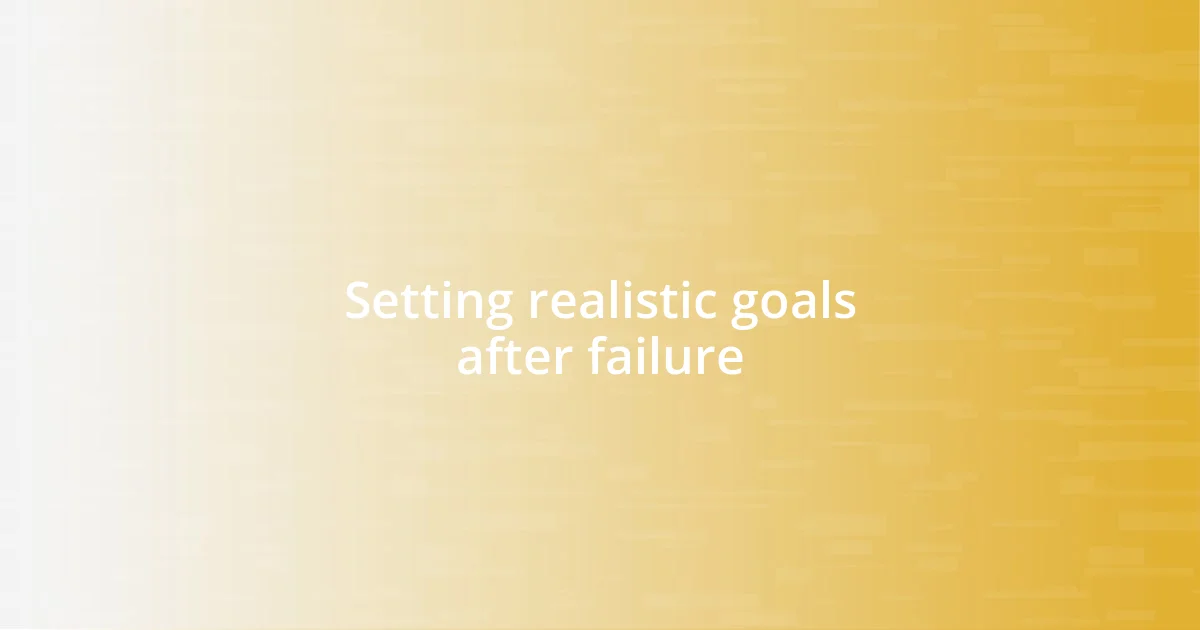
Setting realistic goals after failure
Setting realistic goals after experiencing failure is crucial for recovery and growth. I vividly remember the aftermath of my business failure. Initially, I was overwhelmed by disappointment, unsure of my next steps. It wasn’t until I sat down and mapped out smaller, achievable goals that things began to shift. Instead of trying to launch a full business again, I started by dedicating a few hours each week to refining my skills and understanding my market better. This gradual approach not only made the process less daunting but also reignited my passion for my work.
When crafting goals after a setback, I’ve found it helps to focus on what I can control. After one particularly tough experience, I decided to break my goals into bite-sized pieces. For instance, instead of aiming for an immediate financial gain, I set a target of networking with three industry experts each month. This reset not only felt attainable but also allowed me to build relationships that eventually led to new opportunities. Have you ever noticed how small wins can build momentum and boost your confidence? It’s essential to celebrate those little victories—they pave the way for bigger successes.
Ultimately, I believe that setting realistic goals is about self-compassion and understanding our limits. Reflecting on my setbacks, I often remind myself that it’s okay to take baby steps. There’s no rush to get back on top; the journey itself is valuable. You might ask yourself what small goal you could set today. For me, it was committing to learning something new each week. This shift in mindset not only fostered growth but also made the entire process feel less intimidating and far more enjoyable.
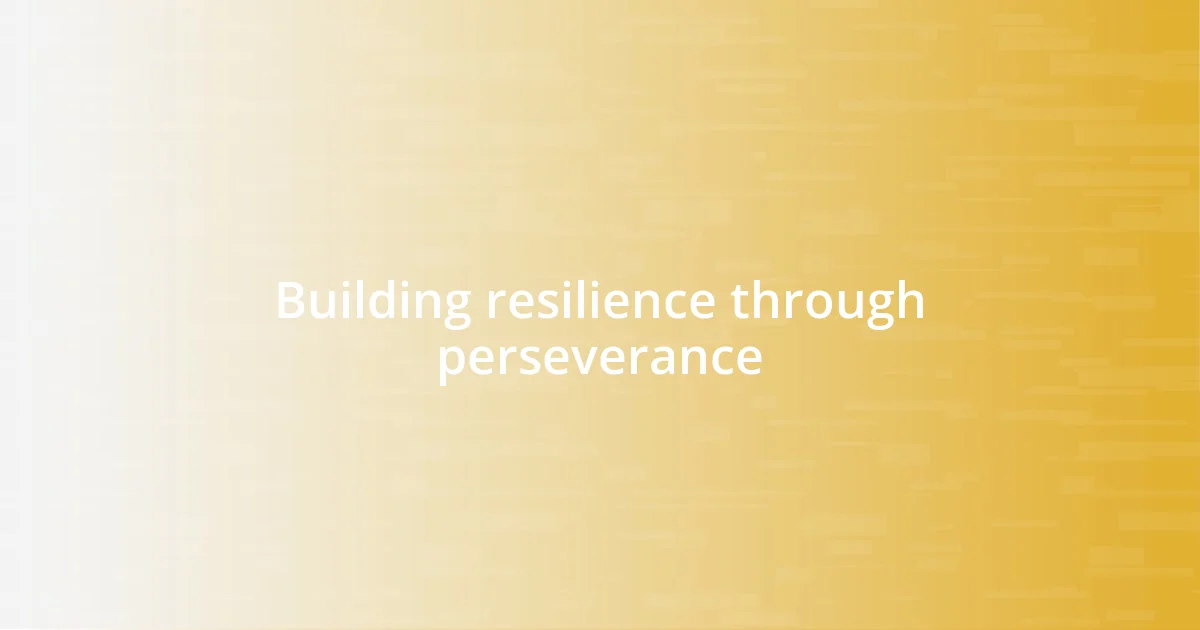
Building resilience through perseverance
Building resilience through perseverance is really a journey all its own. I remember a time during a challenging project at work when everything seemed to go wrong. My initial reaction was to feel defeated and just give up. But instead, I chose to dig deep, recalibrate, and lean into the support of my colleagues. That perseverance transformed my outlook, and slowly but surely, I not only salvaged the project but also learned the true value of teamwork and persistence.
One of the most profound realizations I had was that resilience isn’t about simply bouncing back—it’s about evolving. When I faced a significant setback, I found myself asking, “Why is this happening to me?” After reflecting on it, I shifted my perspective to “What can I learn from this?” That small change in mindset made a world of difference. Rather than feeling like a victim of my circumstances, I began to see every obstacle as an opportunity for growth. Have you ever experienced that shift where failure started to feel less like a roadblock and more like a stepping stone?
As I continued to nurture my resilience, I noticed something beautiful happening: I became more compassionate toward myself. In this fast-paced world, it’s easy to beat ourselves up over failures. But when I stopped to truly honor my efforts, regardless of the outcome, I felt a new sense of strength. I ask myself now, “What journey am I truly on?” This questioning reveals the power of perseverance—it’s about embracing the process and believing in our potential, even when faced with adversity.
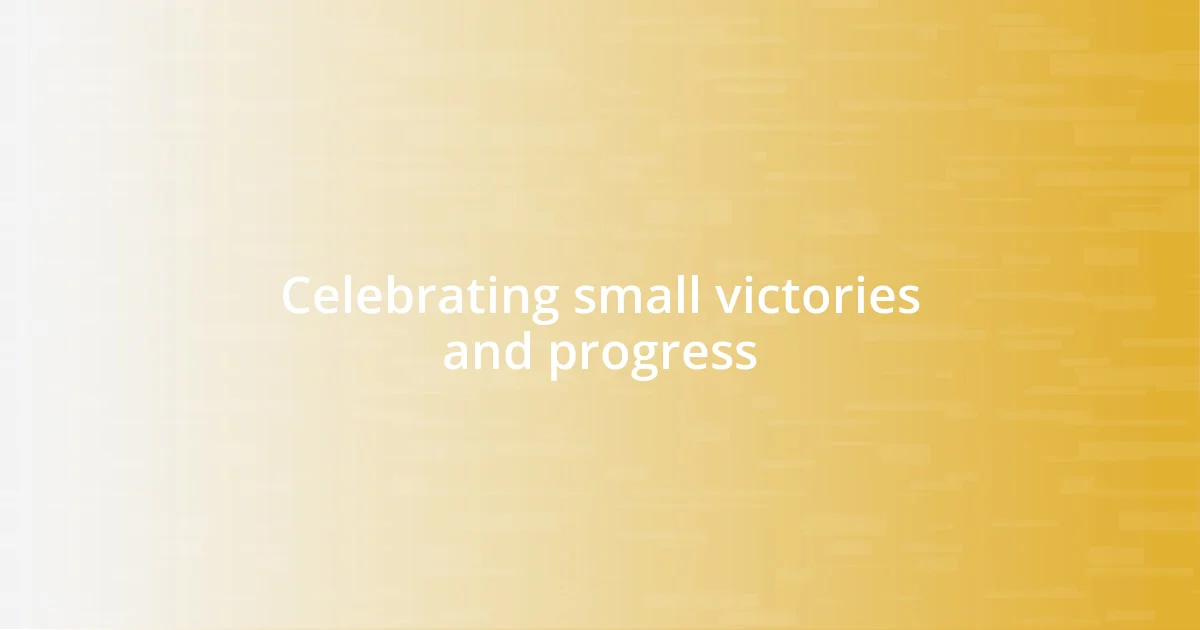
Celebrating small victories and progress
Celebrating small victories is often overlooked, but I’ve come to realize just how vital it is to my personal growth. After a tough period of self-doubt, I started acknowledging the little things—like finally finishing a book on a new skill I wanted to learn or even just getting through a challenging day at work without feeling overwhelmed. These small wins initially felt insignificant, but as I gave them more appreciation, I found that they fostered a sense of accomplishment that propelled me forward.
I think about a time when I launched a side project that ultimately didn’t pan out. Instead of wallowing in failure, I decided to celebrate the fact that I had taken the step to start something new. The first step might have failed, but I learned valuable lessons along the way. Each positive takeaway became a point of focus, shifting my mindset from defeat to forward motion. What small triumphs have you experienced that could be worth celebrating? You might be surprised at the power these acknowledgments hold in jumpstarting your next steps.
It’s fascinating how recognizing progress—no matter how small—can create a ripple effect in our lives. Over time, I’ve begun keeping a journal where I jot down my daily accomplishments. This practice not only provides a sense of gratitude but also uplifts my spirits during tougher days. I find myself going back to these entries, reminding me of how far I’ve come. Have you ever noticed that when you give yourself credit, it becomes easier to tackle bigger challenges? It’s a beautiful cycle worth nurturing, and I encourage you to find ways to celebrate your unique journey.


